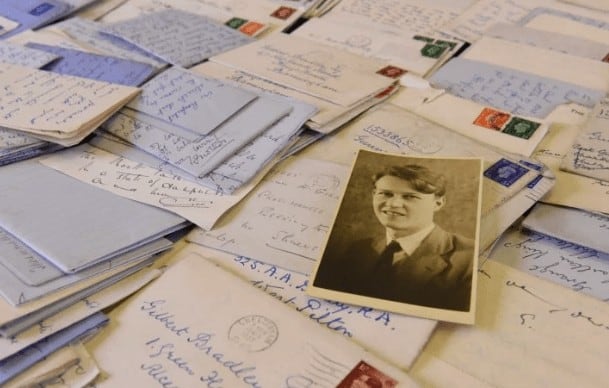Soldiers separated from their loved ones during World War II gazed at photographs of their sweethearts, and wrote love letters in the hopes that one day, they would be reunited and start a family. One soldier, Gilbert Bradley, wrote his letters, too, but he could never keep a photo of his true love because he was a man named Gordon Bowsher.

For decades, their love story remained a secret, and it was hidden away from the eyes of the world. Gilbert Bradley died in 2008, and an estate company cleaned out his house and sold his letters to an antique dealer who specialized in war ephemera. A historian and volunteer at the Oswestry Museum in Shropshire, England named Mark Hignett stumbled upon the letters on eBay while he was searching for historic documents from his hometown. At first, Mark Hignett thought that Gilbert Bradley was writing to a girlfriend or fiance, because they simply signed the letters with the letter “G”. Once he realized that “G” stood for Gordon Bowsher, he was shocked. Letters between gay men are incredibly rare because they were almost always destroyed. Letters between a gay civilian and a soldier? That’s priceless.

Forbidden Love
Mark Hignett bought the collection on eBay, and went on a multi-year quest to search for as many of Gilbert and Gordon’s letters as possible. Many years and over one thousand pounds later, each letter he found gave another missing piece to the story. There are nearly 600 letters in total in Hignett’s collection, and they are on display at the Oswestry Museum.
Homosexuality was illegal at that time, and being caught in the army as a gay man was so much worse. If he was found out, it was likely that he would serve time in prison, or even get shot by a homophobic soldier, and left for dead. It’s not surprising that when World War II began, Gilbert Bradley did not want to be in the army at all. Like so many others, he was drafted in 1939, and had no choice but to obey the government. He pretended to have epilepsy during the medical exam, hoping that they would allow him to stay. Unfortunately, the doctors saw right through it, and he was given a clean bill of health. He was ordered to train as an airplane gunner at Park Hall Camp in Oswestry, Shropshire.

One year earlier, Gilbert met Gordon at a party on a houseboat. Gordon was in a relationship with Gilbert’s nephew, but when they met one another, they had a spark that was undeniable, and they began having a secret affair. Gordon Bowsher’s father was incredibly wealthy. He owned a tea plantation in India, and he also ran a shipping company that delivered goods back and forth from Great Britain and their territories. This rich boy had everything his heart desired, except the one thing that was most important- love. And he found that with Gilbert Bradley. When they learned that Gilbert would be sent off to war, they promised to write to one another as much as they possibly could. Gordon describes the non-stop anxiety over worrying if Gilbert would survive the war, and every letter in the mailbox filled him with so much relief and joy.

